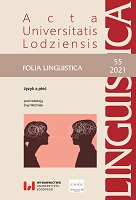Kształtowanie się w polszczyźnie formacji feminatywnych o nacechowaniu pejoratywnym (na przykładzie derywatów formowanych od męskich podstaw na -nik i -arz)
The formation of pejorative feminative formations in the Polish language (on the example of derivatives formed from male bases into -nik and -arz)
Author(s): Karolina TomalaSubject(s): Gender Studies, Morphology, Lexis, Western Slavic Languages
Published by: Wydawnictwo Uniwersytetu Łódzkiego
Keywords: feminative; historical word formation; morphological truncation;
Summary/Abstract: The article raises the issue of historical fate of groups of female derivatives devoid of the morphological element -k-, and thus femnative forms created with the use of the -nica and -ara formants. In the text, these units were analyzed against semantically related, but stylistically divergent, lexemes containing the morphological element -k- (en-ding with - (nicz)ka and -(ar)ka, respectively). Both the historical formative motivation of feminative forms without the morphological element -k- (morphological truncation, suffixal derivation), and the mutual influence of lexical units of each group on each other, are the subject of observation. It turns out that between the derivatives formed in the groups mentioned above, there is an analogy of the relationship between feminatives with the morphological element -k- and lexical units without this element. This feature becomes characteristic in Polish language mainly for female names with a negative emotional tinge. The analysis showed that the historical dependencies of lexical units belonging to the discussed groups of derivatives clearly affect the modern Polish language and many tendencies are also reflected in the latest lexis.
Journal: Acta Universitatis Lodziensis. Folia Linguistica
- Issue Year: 2021
- Issue No: 55
- Page Range: 89-104
- Page Count: 16
- Language: Polish

